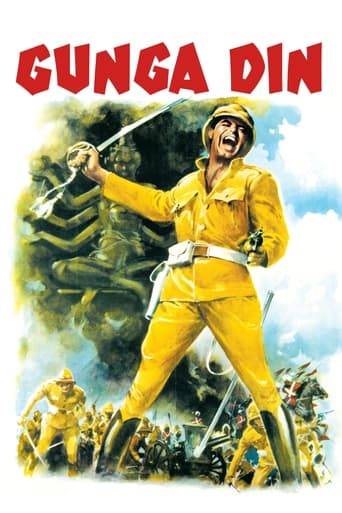John Brooks
This was ridiculously bad. For about half the film, there's no story, we're merely thrown scenes at. Then, it's some of the most stereotypical material you could think of on screen. It's some of the gratuitous, predictable, terribly obvious and unsubtle on screen material, with long bits of dialog in-between, endless battle action, and just more of the same boring filler up to the very end.The exaggeration factor is at an almost paroxysm here, and the whole film suspectly reeks of post-colonial guilt and apology, and yet, at the same time, the indigenous Indians are portrayed in the most derogatory fashion, and there's an overwhelming sense of English pride and more globally a heroic superiority of the West, something extremely prevalent in the films of the time.Pretty, pretty terrible.
l_rawjalaurence
Let's get the obvious out of the way: George Stevens's film contains many of the orientalist tropes that characterized many of the Hollywood India epics of the Thirties: a hero (Sam Jaffe) in blackface, an unashamedly imperialist message positing the British as the saviors of civilized India against the threat of the Thugs led by the Guru (Eduardo Ciannelli), and a celebration of the British virtues of friendship and loyalty as personified by the American Douglas Fairbanks jnr, and the English-born Victor McLaglen and Cary Grant.On the other hand the film must be looked at in context as a fundamentally American story of the frontier wrapped up in a British fictional form. The Indian forces whoop and charge just like the Native Indians - as represented in Westerns of that time - and the Californian locations (standing in for India) remind us of more recent US history and the need for the settlers to protect their lands (the fact that they stole it off the Native Indians in the first place being conveniently forgotten). GUNGA DIN follows in a venerable tradition of films of similar subject-matter produced by most of the major Hollywood studios, including CLIVE OF India (MGM, 1935), LIVES OF A BENGAL LANCER (Paramount, 1935), and WEE WILLIE WINKIE (20th Century-Fox 1937), also starring McLaglen.In historical terms GUNGA DIN can also be approached as a warning against the evils of Fascism and dictatorship as personified by the Thugs, who are prepared to fight dirty at all costs to secure their aim of ruling the whole of India. It is only due to Gunga Din's selfless act of devotion to the British in alerting the troops as to the Thugs' plans that the colonial army is actually saved.In structural terms, George Stevens's film contains everything - plenty of swash and buckle at the beginning and end, some moments of pure comedy involving Grant, McLaglen and the luckless Sergeant Higginbottom (Robert Coote), a brief love-interest sequence with Fairbanks and a youthful Joan Fontaine, not to mention an inspiring end where Rudyard Kipling (Reginald Sheffield) crawls out of the tent canvas to pen the famous poem that provides the inspiration for the entire work. In short, there is something for just about everyone here.
Edgar Allan Pooh
" . . . of jeweled swords and mustache wax," the Thug guru informs the featured British sergeant trio of GUNGA DIN. The Guru's band of Thugs were the ISIS of their day in Victorian India. The British Empire used to be larger than Russia or China, but an over-abundance of mustache wax at the top has reduced it to a puny island tagging along today as a European afterthought. Though we humor the Brits by continuing to call the American language "English," GUNGA DIN illustrates how England historically launched one suicide attack after another (see THE CHARGE OF THE LIGHT BRIGADE) unless there was a foreigner handy, such as Mr. Din, to save them from their own folly. GUNGA DIN was the original "Bhisti Boy," who saved thousands of Brits from going to their slaughter like bag-piping sheep, with his own timely bugling. (Of course, Mr. Din's tribute band modernized the spelling of his rank to "Beastie Boys.") The main lesson of GUNGA DIN--repeated again and again--is that, "Pride (and mustache wax) goes before the Fall."
tomntempe
I know this is supposed to be a "Great Movie". And it's not awful. But the only reason I can see that people think it's "great" is because it's old and it has some "stars" in it. Most of the acting is abysmal caricature. The brits practically strut around saying "Pip pip pip, cheerio, spot of tea, say what?" throughout. Watching the three main characters, the Sergeants, all I could think of was that whoever wrote this must also be moonlighting writing Three Stooges scripts. It *is* an interesting movie in a historical context, both as an expression of movie making of that day and of the underlying story of the Thuggs. But being interesting isn't the same as being "good". Plan Nine from Outer Space is also interesting.... So if you haven't seen it, it's worth watching, but it's no great movie. I would never watch it a second time in a decade.



